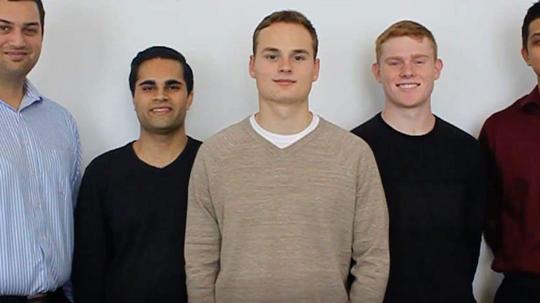
Wattcoin Labs, a startup out of University of Wisconsin Madison and Illinois Institute of Technology, aims to be the payment platform that drives renewable energy consumption and transfer.
Using blockchain technology, they've created a digital currency where people can transact energy without a central bank, similar to Bitcoin. Their goal is to improve access to energy for people who aren't on the grid, create rewards for energy efficiency, and allow users to trade carbon and carbon value at a microscale.
"In ways that Bitcoin changed financial transactions, Wattcoin will change energy transactions," said Wattcoin founder Ben Johanns, a sophomore at UW-Madison and a Naperville native. "It is the beginning of the ‘Energy Internet.’"
It is the beginning of the ‘Energy Internet
Their technology has a number of applications including setting up peer-to-peer energy transactions and renewable energy loyalty programs for utilities companies, but they're starting out with payments for solar home systems in emerging markets, hoping to reduce dependency on kerosene and provide a payment solution for the unbanked.
Wattcoin is currently developing the payment platform for Chicago energy company Veriown's forthcoming solar home system. Users purchase Wattcoin credits on a smart payment card from a local vendor (who completes the transaction on his or her smartphone), and place the card on a reader which converts the credits into energy that can power a light or smartphone charge (you can see a demo in the video below).
They're aiming to address the question: "How can you transact for energy in the most rural places in the world?" said Johanns.
He pointed out that kerosene (used by 1.3 billion people worldwide for light) causes both pollution and health problems. While renewable energy solution could provide a safer and cleaner energy option, the World Bank reports less than half of adults in South Asia and about a third of adults in sub-Saharan Africa have bank accounts, which makes paying for renewable energy difficult. Johanns believes Wattcoin can bridge that gap.
Veriown demoed the solar home system with Wattcoin tech at the Energy Revolution Conference in Sierra Leone last spring, which led to 9,000 pre-orders (Veriown then paid for further commercialization and development of Wattcoin tech). They're rolling out 45,000 units across three states in India (Uttar Pradesh, Gujurat, and Tamil Nadu) by late Q2 of this year, and are planning for a larger roll out by the end of the year.
In ways that Bitcoin changed financial transactions, Wattcoin will change energy transactions
Johanns previously worked as an intern at Veriown (his father, Steve Johanns, is the CEO) and has been Bitcoin mining since he was in middle school. Wattcoin team members also include recent Illinois Tech electrical engineering grad Jimmy Shah, current Illinois Tech electrical engineering graduate student Farsh Umrigar, UW-Madison electrical engineering sophomore Tyler Barker, and recent University of Pennsylvania grad Kristopher Jenk. Wattcoin will compete for $50,000 in the upcoming CleantechUP competition, held by the Clean Energy Trust and Department of Energy.
As they move forward, Johanns sees Wattcoin as a platform-as-a-service company that makes money through licensing and transaction fees as they continue to roll out solutions. Next up, they're working on a prototype of a carbon credit exchange on the blockchain.
The energy industry needs a more "nimble" payment infrastructure, some have said, as independent wind and solar farms feed into the grid. Other startups besides Wattcoin are developing blockchain technology for the energy industry, such as New York-based LO3 Energy.
"The reason blockchain is so transformative and why Wattcoin is using it is because the blockchain creates a great platform to move value across a global network without an intermediary or ‘middleman,'" explained Johanns. "In the case of energy you can create transactions for both [kilowatts] of energy as well as the carbon value of the energy. [This] allows for some disruptive business models where people can transact energy and carbon credits, or carbon offset credits, between themselves without going through middleman or utility."








